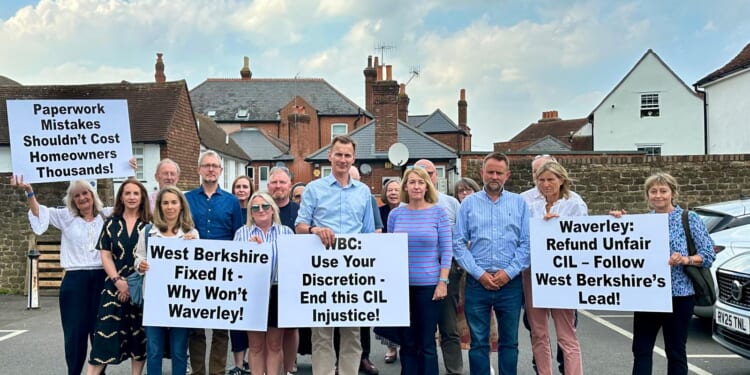Cllr Jane Austin is the Leader of the Conservative Group on Waverley Borough Council
Last October, Godalming resident Steve Dally came to me at his wits’ end after five years of battling Waverley Borough Council’s planning department. Steve and his wife had been forced to remortgage their home to pay a £70,000 Community Infrastructure Levy (CIL) charge on their house extension.
Steve is no rogue developer being brought to heel. He and his wife are ordinary, law-abiding homeowners who, like thousands of families up and down the country, have worked hard all their lives to buy and improve their home. But, because of issues with CIL legislation and its application by my Council, Waverley, they have faced years of stress and anxiety.
CIL is a levy on developers, designed to ensure they contribute to local infrastructure. Homeowners extending, self-building, or adding annexes are supposed to be exempt (if the development is over 100 sq m you must fill out a series of forms to secure the exemption). Yet homeowners are being hit with life-changing bills. Why? Because of poorly drafted legislation, confusing exemption paperwork, and councils applying the rules with no discretion.
In Waverley alone I am in touch with 15 families who have faced charges between £40,000 and £235,000. One was billed £55,000 for a 3m² extension; another charged £75,000 for a loft conversion. Ian Colvin is now selling his family home to pay a £92,000 bill after a third party made an error in his paperwork. Looking wider, the Wong family in Merton are fighting £85,000 for not submitting a form, having been told verbally they were exempt. Maria Dobson in West Berks was charged £25,000 for an error on her form. The accounts given by those hit are extremely concerning.
If that CIL demand notice does drop through your letterbox, CIL legislation is full on: you must pay within 90 days or risk seizure of assets and imprisonment. If you don’t comply you get slammed with thousands of pounds of late charges and interest on top. It is robust legislation, drafted to incentivise a developer to cough up; but utterly terrifying for homeowners. Families are now being treated like commercial developers and financially ruined for honest mistakes.
Some have had to sell the homes they have worked for all their lives. The stress and the injustice of it all has caused serious mental and physical health issues. Many have additionally spent thousands of pounds on legal and other fees fighting the charges, unsuccessfully in most cases.
As national press coverage has grown, the floodgate of cases has opened. We are now aware of at least 75 cases across 12 councils, including Chester, Merton, Bracknell, Barnet and Sevenoaks …. with more residents coming forward every day.
This is not what Parliament intended when CIL was introduced.
Why is this happening?
Anyone who has applied for a CIL exemption will be able to confirm it is not a straightforward process – many are caught out filling out forms incorrectly / too late. In many cases homeowners are not even aware of the existence of CIL.
One particularly awful trap is if a council deems your planning application to be retrospective – in this circumstance the householder becomes automatically liable for the CIL charge. There is no right of appeal. If the council thinks you have started work on site before the exemption has been granted, that’s it – liable. No appeal. An error filling out the form? You are liable. This makes CIL regulations stricter than even HMRC which allows taxpayers to correct mistakes.
Around 200 councils operate CIL. Yet only a handful, including Lib Dem–led Waverley and West Berkshire, have seen clusters of these unfair cases. Why? Because this is also about how councils apply the rules. While some councils use a pragmatic common-sense approach in applying CIL, others (including Waverley) have followed the legislation to the letter without regard for its over-riding intention. Some Council’s CIL balances (including my Waverley Council) run into the many millions unspent and unallocated. I find this hard to morally justify.
Councils need to fix this – time for refunds
West Berkshire faced a similar crisis last year. It commissioned an independent investigation and refunded approximately £400,000 to 18 homeowners through a successful discretionary review process. By contrast, Waverley has refused to follow suit. Despite a unanimous council vote in January to adopt West Berkshire’s approach, the Lib Dem Executive has restricted its “review” to cases where the council itself made an error. If a resident – or even a professional adviser – made the mistake, the resident is still left to carry the burden.
Councils need national guidance to follow West Berks model to enable refunds at a local level.
Change the legislation
We are making progress. My constituency MP, Sir Jeremy Hunt, called this scandal “absolutely outrageous”; both he and Greg Stafford MP have been working with my council group to support residents locally and fight to change the legislation. In July Sir Jeremy Hunt MP and I met with Labour Housing Minister Matthew Pennycook who subsequently publicly confirmed:
“A series of individuals across the country have been very badly hit by this. It is very clear to us that the CIL regulations in question are not intended to operate in this way, and we are giving very serious consideration to amending them to ensure that no-one else is affected in this manner.”
I am working with my Conservative colleagues in Parliament, along with the LGA and the Conservative Councillors’ Association, who are now fully engaged in fixing this injustice.
Shadow Housing Minister Gareth Bacon MP said:
“The testimony is shocking. We must fix this so no more residents are unfairly charged – and ensure a process is put in place to right this injustice for those already hit.”
And Mr Dally? After months of mounting pressure on the Council he finally received a refund last July when the council admitted error in his case. He is still waiting for a public apology.
But others remain trapped, and we MUST fix this for them too. Watch this space.
And in the meantime, look out for my next piece – on how councils are quietly accruing millions in interest from CIL receipts, and using it to fund their day-to-day operations instead of much-needed infrastructure.











![Keith Ellison Caught Promising to Fight State Agencies for Somali Fraudsters [WATCH]](https://www.right2024.com/wp-content/uploads/2026/01/Keith-Ellison-Caught-Promising-to-Fight-State-Agencies-for-Somali-350x250.jpg)





